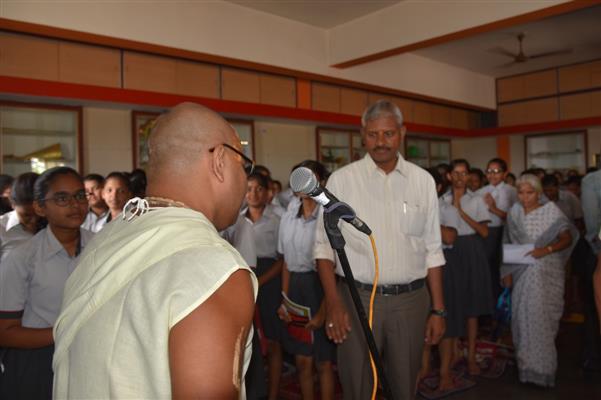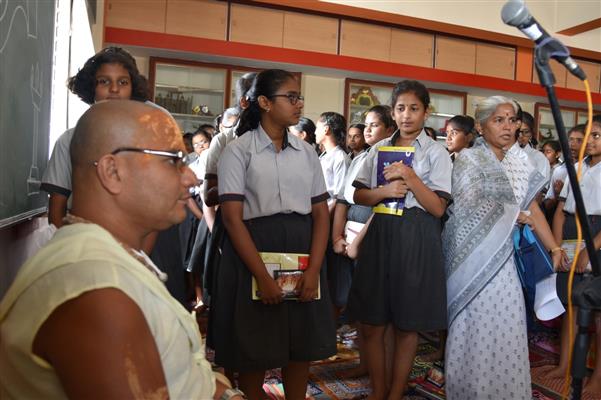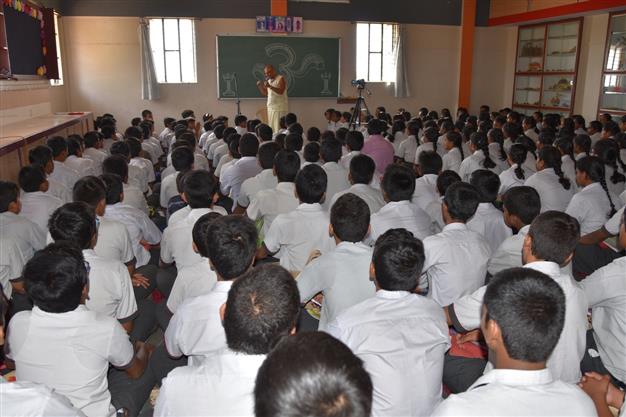Orientation about ‘Valuing the Cultural and Spiritual Values’

India is the origin for values and culture. Values play a vital role in the glory of a nation. Unfortunately, in the present technological and globalised era, values are diminishing day by day. People are living in the materialistic relationships which are not desired for the harmony of society. Thus, there is an urge for teaching moral, cultural and spiritual values for students along with academics.
Swami Balakrishnan, the native of Madhya Pradesh, is the disciple of Guru Vallabha Das. We cordially invited Swami Balakrishnan to our school. He addressed our students for three days, i.e., on 25, 26 and 27 of June 2018, at one hour per day. He inculcated the very essential and core elements of Indian culture among the students of classes 8, 9 and 10 in an effective manner. He interacted with the students and made them to involve to a greater extent. In his speech, he stressed to value the values, and the people having values.
We welcomed Swami Balakrishna Das whole-heartedly, to our school on Monday, 25 June 2018. He explained the students on the principle of becoming good to great, respecting and following Indian culture, and how to reach the apex of success.
He elucidated us about the four major virtues of our Indian culture, namely ‘Matrudevobhava, Pitrudevobhava, Acharyadevobhava and Athidhi-devobhava’ on the first day.
Acharyadevobhava:
Swamiji said that every one requires a guru. ‘Acharya’ means ‘Guru’ or ‘Teacher’ who bestows knowledge and wisdom for his pupils. Teachers teach us many skills, techniques and moral values. They nurture culture and character. They guide us in spirituality. They show the path of success.

We should respect teachers and treat them as our family members. We should not be angry with them or misunderstand them for any reason. The way that they treat us, is just for our bright future and prosperity. So we should respect them and care them. A teacher is also equal to a second mother for us.
Matrudevobhava:
Swamiji portrayed the significance of ‘mother’ very emotionally. The pains that she tolerates for her children are inexhaustible. Her love towards children is pure and unconditional. She really works very hard for her children irrespective of time schedule without thinking about herself throughout her life.
We should interact with her about activities done in school. Sometimes we misunderstand our mother and oppose her for simple reasons. We cannot return her the kindness, love and affection that she showered on us. Swamiji’s words about mother really touched our hearts.
We should love our mother. We should respect her and take her blessings by touching her feet every day. We should help her in her works. In his speech, he added that it is our custom to show gratitude and love to mother, and try to return her what she gave us.
Pitrudevobhava:
Swamiji highlighted the role of a father in a family with many unrecognised aspects clearly. Usually, we all of us do not love our father much. We feel that he is strict. We get afraid of him. But he is the hard worker in the family in order to take care of the family.
He strives to make the family happy and safe. He struggles to earn money day and night for his family. We do not understand his pain and feelings. We remember him only when we want to buy something. He doesn’t take anything for himself. His happiness lies in the happiness of his family. So, we ought to be respectful and affectionate towards father.

Atithidevobhava:
Swamiji said that India is renowned for the virtue – ‘Atithidevobhava’. We should always welcome our friends or relatives or well-versed people as guests. We should know the value of an ‘Atithi’ and we should respect him/her. He claimed that we should care for an ‘Atithi’ as he/she is the form of God.
We should always help the one who is in need of help. We should never make friendship by seeing beauty or money or any mortal qualities of a human being. We should value the eternal godly qualities of a human being. We should encourage and help our friends in all the possible ways honestly. Then one day god will help us when we are in need or trouble. So, let us help this world which is in need of others.
* * *
On the second day, Swamiji detailed us about the requisite qualities and behaviour of a student. He addressed many important aspects of a student’s life. He convinced the students about how to lead the student life. According to Swamiji, the word ‘STUDENT’ explains us about the life as given below.
S – Sacrifice
T – Truthfulness
U – Uniqueness
D – Dedication
E – Eagerness (Burning Desire)
N – Nationality
T – Talent
Here, the 7 letters of the word convey that every student should be ready to sacrifice egoism and bad qualities; should be truthful to our parents, teachers, and friends. Students are unique in different ways. Students should have the dedication to achieve something or to become good to great. Eagerness or the burning desire is the most required quality in a student’s life to know more about the world. A student ought to have the patriotic attitude towards our nation, the mother India. A student should acquire enough talent to fulfill his/her ambitions along with the above mentioned merits.
So, in order to become ‘good to great’ a student should mould himself as a ‘STUDENT’.
* * *
On the third day, Swamiji planted the seeds of spirituality very effectively. He explained us about the importance of chanting ‘Hanuman Chalisa’. Some lines of ‘Hanuman Chalisa’ convey us about how to be strong, how to gain knowledge and how to exhibit our talents. It reveals about the confidence that lord Hanuman has. Many people are devotees of Him and chant Hanuman Chalisa regularly to attain good qualities.
Swamiji appreciated the Indian Vedas, Upanishads and Puranas which are Jnana-Nidhi. Swamiji quoted a sloka from Hanuman Chalisa that ‘Yug Sahasra Yojana Para Bhanu! Leelyo Taahi madhur Phal Janu’. He explained the meaning of it.

1 Yug = 12000 years; 1 Sahasra = 1000; 1 Yojana = 8 miles
1 Yug × 1 Sahasra × 1 Yojana = 12000 × 1000 × 8 miles
= 9,60,00,000 miles
= 9,60,00,000 × 1.6 km
( 1 mile = 1.6 km approx.)
= 1,53,60,00,000 km
This is the distance from the earth to the sun. Lord Hanuma jumped to the sun from the earth, thinking that sun is a sweet fruit to eat.
NASA said that, 1,53,60,00,000 km is the exact distance from the earth to the sun.
Hence, it is evidently proved that our ancient scriptures are meaningful and scientific. Unfortunately, they are hardly recognised and valued. Swamiji said that it is our tradition that before going to start some good or auspicious work, we pray to lord Hanuman and then we begin the work. Thus, Swamiji guided our students about the significance of Indian ethics and our tradition.
He elevated the willpower of the students with his powerful speeches on all the three days. He clarified the doubts expressed by students. Also, he answered the questions asked by the students. All his three sessions were well organised with knowledgeable words. He articulately involved the students and encouraged them by giving gifts like pens to those students who answered his questions correctly.
We are really grateful to Swamiji, not only for his valuable words but the affection and love that he shared with our students. We hope that his blessings lead our students to become great students from good students.